Gee.ly
Never tried Geely cars, but they say they are okay and cheap. I went to geely.com but got lost in unreadable characters. The actual web page covering cars is hidden some where two level deep under the ground: http://www.geely.com/brands/international/
So, for European distributors it would make sense to go for something simple and jingling.
Gee.ly - is a good choice and the domain is still available. So hurry up. Or it will be gone quick.ly like audi.tt.
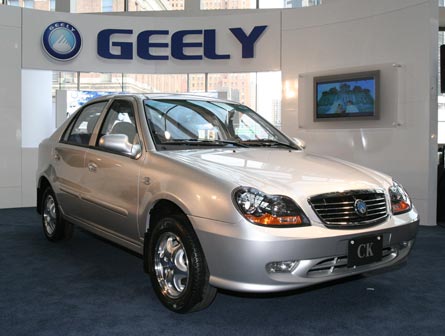
Before buying though, consider the following two articles:
The Economist : Leaders : Emerging-market multinationals : Not so nano
The financial crisis may have strengthened the hand of the developing world’s emerging giants
The world’s cheapest car, the Tata Nano - launched this week in Mumbai in a burst of flashbulbs and national pride - has turned the spotlight once again on the developing world’s emerging multinationals. From ArcelorMittal in steel to ZTE in telecoms, ambitious companies from India, China and other developing nations have marched onto the global stage in recent years, spooking the rich world’s established multinationals with innovative products and bold acquisitions. The Nano is a symbol of the ambition of these emerging giants.
But much has changed since Tata Motors first took the wraps off the tiny car in January 2008. The financial crisis, collapsing stockmarkets and plunging commodity prices have hit companies in rich and poor countries alike. Tata Motors, which bought Jaguar Land Rover, a British premium carmaker, from Ford last year for $2.3 billion, now faces the difficulty of refinancing its debt, and was downgraded this week by Standard & Poor’s (see article). Does this mean that the threat to established giants from emerging-market giants has receded?
Far from it. The crisis has strengthened the relative position of the emerging giants, for several reasons. First, as companies and consumers around the world cut costs and trade down, the emerging giants’ low-cost production models, based on cheap local labour, provide even more of an advantage. Second, even though growth in developing countries has slowed, it has not vanished altogether, so the emerging giants can fall back on their domestic markets. Car sales have collapsed in the rich world, for example, but are still growing in many developing countries: they are expected to increase by 10% this year in China, for instance.
Third, many rich-country multinationals have become much more inward-looking as they struggle to cope with the recession, and are less able to invest to defend their market positions, providing opportunities for disruptive new entrants. Again, a good example is that of carmaking, where the convulsions of the established giants, and the switch to greener technologies, give newcomers an opening. Ratan Tata, the boss of the Tata Group, spoke this week of his ambitions to sell the Nano not just in Europe, starting in 2011, but eventually in America, too. The electric car made by BYD, a Chinese battery-maker that branched into carmaking a few years ago, was the talk of the Detroit motor show in January.
Furthermore, many cash-strapped multinationals in the rich world are now trying to sell bits of themselves to raise capital, giving buyers in the developing world a chance to pick up technology, brands and other assets, says Harold Sirkin of the Boston Consulting Group, whose book “Globality” charts the rise of the emerging giants. Two Chinese carmakers, Chery and Geely, are interested in buying Volvo from Ford. Mahindra & Mahindra, an Indian maker of utility vehicles, is in the running to buy LDV, an ailing British truckmaker; there is also talk of a possible Chinese bid. Vale, Brazil’s mining giant, recently picked up a clutch of assets from Rio Tinto, its debt-laden Anglo-Australian rival. And ZTE, a fast-growing Chinese telecoms-equipment company with customers in over 60 countries, has been mooted as a possible buyer of the handset division of Motorola, the ailing American firm that ZTE is on the verge of evicting from the industry’s top five.
They’re behind you
There are, of course, weak points among emerging-market giants. Some, including Tata Motors, overextended themselves when commodity prices were high and credit was easy to come by. Mexico’s Cemex, the world’s third-largest cement firm, is selling assets around the world as it struggles to meet its debt repayments. ArcelorMittal, the world’s biggest steelmaker, which grew into a global giant from its roots in Indonesia, Trinidad and Mexico, launched a $1.5 billion convertible-bond issue this week to refinance some of its debt. But plenty of rich-world multinationals made the same mistakes and face similar problems, or worse.
The emerging giants of the developing world are still a rising force during the good times. The launch of the Nano serves to remind rich-world bosses that they still need to keep an eye on their rear-view mirrors.
Source: The Economist
And if you for a Nano, forget about nano.com - that one is gone long time ago along with mynano.com. So is www.na.no - not so sexy anyway. You may consider Nano.Me, Nano4.Me or even MyNano.Me.
Wait for the crash test before buying indeed:
Geely ‘Death Vessel’
The Geely Zi You Jian is a small sedan from Geely, its one of their newer designs, although we’re not sure of its correct English name, thus China Car Times refers to it as the ‘Freedom Vessel’ which is pretty much its Chinese name translated to English.
The Freedom Vessel recently took part in a Russian crash test, and the results were not good, so bad in fact, that the Geely Freedom Vessel was renamed the ‘Death Vessel‘ and was awarded 0 stars.
Other Chinese companies have succesfully crash tested in Russia, including Lifan (5 stars) and the BYD F3 (unknown, rumored to be above 3)
The Chinese motoring press are saying the crash test was carried out by the Russian magazine, Automotive Review. Automotive review bought the car from a local dealer for just less than $12,000USD. The test was carried out at the Euro NCAP speed of 64kph, which is slightly faster than the local Russian standard of 53kph. Geely did not have any knowledge of the crash test.
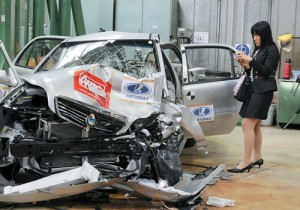
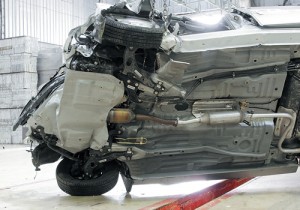
In 2006, Geely sold 800 units of the Freedom Vessel to Russia, in 2007 Geely sold 8000 units, so its fair to say that Geely Freedom Vessel is popular in Russia, but will strong sales continue into 2008? We will wait and see.Source: China Car Times
All references [1 - 10]
Short link: http://name.ly/~aBQJ$j
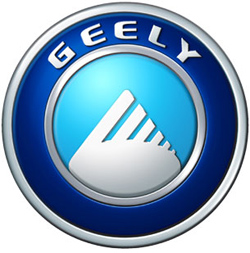
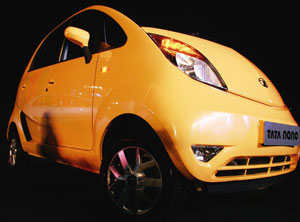
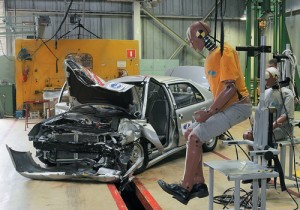



I would go for car.ly, while it is still available. I am wondering how long will it last.
Also a maiden name: Carly [ http://images.google.com/images?q=carly ].
Too good to leave it free.